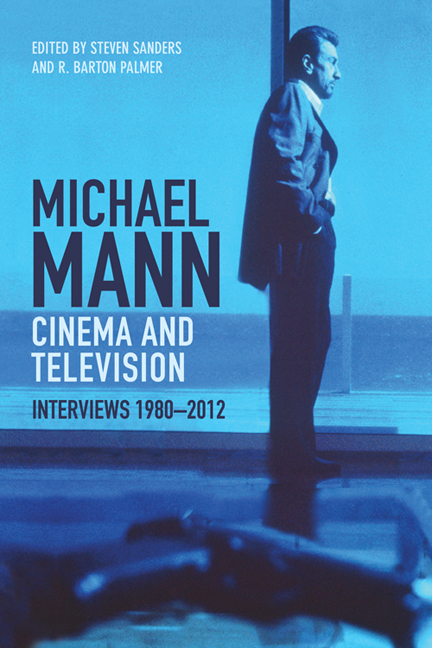Book contents
- Frontmatter
- Contents
- List of Illustrations
- Acknowledgements
- Introduction: Michael Mann in His Interviews
- 1 Four Minute Mile
- 2 Castle Keep
- 3 Of Vice and Mann
- 4 Manhunter: An Interview with Michael Mann
- 5 Michael Mann: Hollywood Writer–Director–Producer
- 6 Mann and His Movies
- 7 All the Corporations’ Men
- 8 Smoking Gun
- 9 “Ali Likes the Film a Lot. He's Seen it Six Times”
- 10 Paint it Black
- 11 Mann Among Men
- 12 L.A. Belongs to the Coyotes
- 13 Michael Mann Interview
- 14 A Mann's Man's World
- 15 Number One with a Bullet
- 16 The Study of Mann
- Chronology
- Filmography
- Publisher's Acknowledgments
- Index
6 - Mann and His Movies
Published online by Cambridge University Press: 05 September 2016
- Frontmatter
- Contents
- List of Illustrations
- Acknowledgements
- Introduction: Michael Mann in His Interviews
- 1 Four Minute Mile
- 2 Castle Keep
- 3 Of Vice and Mann
- 4 Manhunter: An Interview with Michael Mann
- 5 Michael Mann: Hollywood Writer–Director–Producer
- 6 Mann and His Movies
- 7 All the Corporations’ Men
- 8 Smoking Gun
- 9 “Ali Likes the Film a Lot. He's Seen it Six Times”
- 10 Paint it Black
- 11 Mann Among Men
- 12 L.A. Belongs to the Coyotes
- 13 Michael Mann Interview
- 14 A Mann's Man's World
- 15 Number One with a Bullet
- 16 The Study of Mann
- Chronology
- Filmography
- Publisher's Acknowledgments
- Index
Summary
Michael Mann's heroes are single-minded, to say the least. The athlete in his 1979 prison movie The Jericho Mile just runs, and when he's not running, sits in his empty cell, flexing. Someone asks him what he's into. “I am into nothing,” he snarls, “that's how I do my time.” Hannibal Lecter in Manhunter – Mann's 1986 precursor to The Silence of the Lambs – doesn't even run, just sits and snarls. And James Caan, as the larcenous hero of Thief, turns down an offer from the mob, spitting out: “I am Joe the Boss of my own body.”
Caan actually looks strangely like Mann in that film, so is the director an existentially focused hard case in the same league? You have to wonder. His office promises that he'll call me for a phone interview as soon as he gets up – usually around 5.30am.
Mann has long been known as one of the hardcore hustlers of American film and TV, a hungry aspirant to the Kubrick class of control freak. For several years he overlorded, as executive producer, the massively successful Miami Vice, a cop series notorious for its stylistic overload, for its wholesale promotion of sunsets, pastels and AOR rock soundtracks. But he's only intermittently been taken seriously as a film director. Most people became aware of him with Manhunter, not so much a serial killer thriller as a near-abstract fantasia in modernist interiors. He finally won widespread acclaim, for ambition as much as achievement, with his mammoth treatment of the American wilderness epic The Last of the Mohicans (1992). But the film which finally has even previous detractors muttering about greatness is Heat, this year's sprawling heist saga.
Heat figures in this weekend's Mann retrospective at the National Film Theatre, along with his director's cut of Manhunter, and sample episodes of Miami Vice and his other long-running cop series Crime Story. What it doesn't feature is a late eighties TV movie called LA Takeover, a dry run for Heat based on a script Mann has had ticking ever since 1980. Mann has often refuted accusations of being a stylist – “Style just gets you seven minutes of attention,” he has said – but surely it's the style that makes the difference between LA Takeover's flimsy wham-bam and the monolithic presence of its cinema variant?
- Type
- Chapter
- Information
- Michael Mann - Cinema and TelevisionInterviews, 1980-2012, pp. 57 - 60Publisher: Edinburgh University PressPrint publication year: 2014



